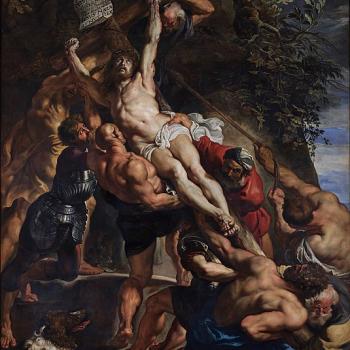Popular author James Reston, Jr., has written a book entitled Luther’s Fortress: Martin Luther and His Reformation Under Siege , about Luther’s time in Wartburg Castle, when he was in hiding from the Emperor’s death sentence. Here he began his translation of the Bible. It took him a mere 10 weeks to translate the New Testament.
, about Luther’s time in Wartburg Castle, when he was in hiding from the Emperor’s death sentence. Here he began his translation of the Bible. It took him a mere 10 weeks to translate the New Testament.
After the jump, a link and an excerpt to Reston’s revealing discussion about Luther’s translation, his method and his approach, including a comparison with the King James translation, which took 48 translators 10 years.
From James Reston, Jr., No Iota in Vain: Martin Luther’s ‘Great and Worthy Undertaking’ | The Behemoth:
One can only imagine the spare look of Luther’s cell as he settled into his monumental task of translating the New Testament. With only his Greek and Hebrew texts as physical references, and no library to consult or clutter, delay or confuse his labor, his concentration was total. It would be easy to romanticize the process. But a more realistic vision involves sweat and frustration, long hours, and a feeling of being overwhelmed. He approached the assignment with awe. Later, he would call it “a great and worthy undertaking” and say that, given the unsatisfactory Bibles then available to the common person, “the people require it.” But the language of the Bible dazzled him.
He truly believed that he was dealing with the very words of God.
“One should tremble before each letter of the Bible, more than before the whole world!” he would say later. “God is in every syllable. No iota is in vain.”
His first challenge was to establish the rules for his translation. Above all, he needed to keep his audience upmost in his mind. What could a typical German understand? What should be the tone? What should be the grammar? “It is not enough to know the grammar of a biblical passage,” he would say later. “One must observe the sense. I held fast to the meaning . . . as if I understood neither Greek nor Hebrew nor Latin.”
In his first days of labor, he evolved two basic principles of translation. The first was to reduce all things to the most general, basic origin and type. “If a passage is obscure I consider whether it treats of grace or of law, whether wrath or forgiveness of sin, and with which of these it agrees better. By this procedure I understand the most obscure passages.” The second was to submit ambiguous passages to the original Hebrew and not lazily fall back on literal translation, as he felt the Talmudic scholars had done. . . .
When one compares the complexity, speed, and intent of Luther’s translation not only to the Vulgate but also to the King James Version of the Bible 90 years later, Luther’s translation is even more impressive. If Luther’s fundamental approach was to make the Bible accessible to the common person, the approach of King James’s translators was to please and glorify the king himself with elegant, poetic verse. Their process in the early 1600s would take ten years, not ten weeks, and there were forty-eight translators, not one.
[Keep reading. . .]
, about Luther’s time in Wartburg Castle, when he was in hiding from the Emperor’s death sentence. Here he began his translation of the Bible. It took him a mere 10 weeks to translate the New Testament.
















